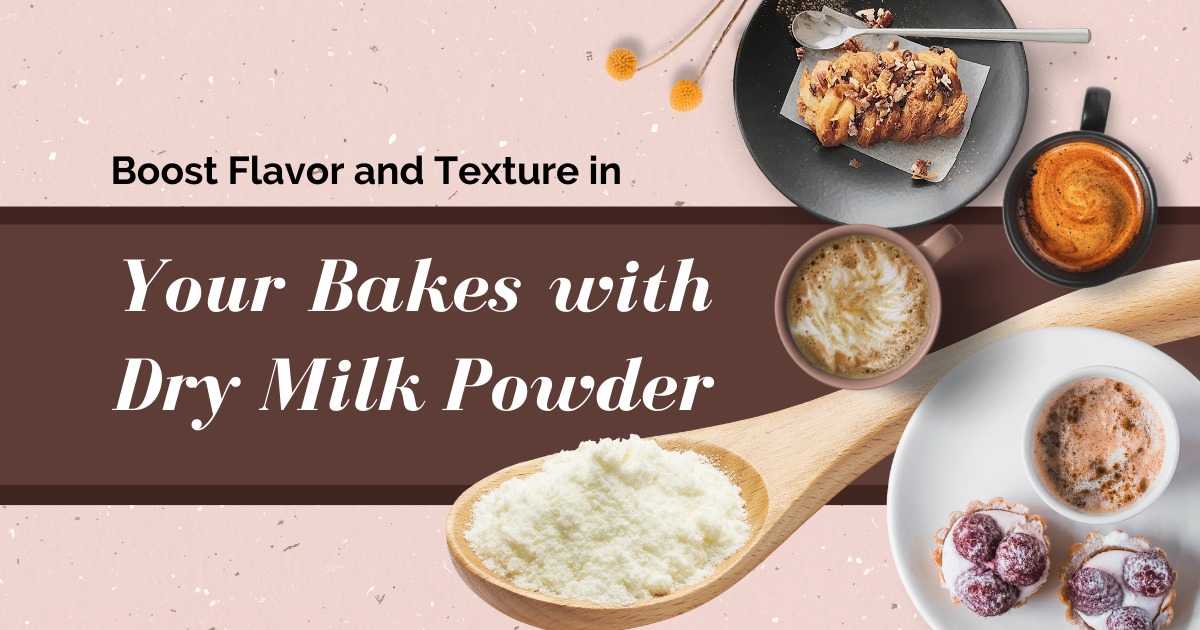Have you ever encountered a recipe calling for dry milk powder and wondered what it is and how it works? Well, wonder no more! Dry milk powder is a shelf-stable baking essential that can elevate your creations to new heights. But how, you ask? Let’s delve into the world of dry milk powder and discover how it can boost both the flavor and texture of your favorite baked goods.
Understanding Dry Milk Powder
So, what exactly is dry milk powder? It’s simply milk that has been evaporated from its moisture, resulting in a fine, concentrated powder. This handy ingredient comes in various types, including whole milk powder, skim milk powder and even buttermilk powder. Each type offers slightly different characteristics, but all share the remarkable ability to enhance your baking experience.
Dry milk powder also boasts a surprising amount of nutritional value. It’s a good source of calcium, protein, and essential vitamins, making it a beneficial addition to your baking repertoire.
Boosting Flavor with Dry Milk Powder
Now, let’s explore the magic of dry milk powder and how it can transform the flavor profile of your baked goods. Here’s how:
Enhancing Dairy Flavor
Dry milk powder intensifies the natural richness and depth of dairy taste in your creations. Think richer breads, creamier cakes, and more satisfying cookies.
Adding Depth
Beyond just dairy, dry milk powder adds a subtle complexity that complements other ingredients beautifully. It rounds out flavors and creates a more harmonious taste experience.
Complementing Ingredients
Dry milk powder plays well with others! It can enhance the chocolaty notes in brownies, elevate the sweetness of fruit fillings, and even balance the tanginess in lemon bars.
Recipes that benefit from the flavor boost of dry milk powder include:
- Bread
From classic white bread to hearty sourdough loaves, dry milk powder adds richness and depth.
- Cakes
Coffee cakes, carrot cakes, and even pound cakes benefit from the enhanced flavor and texture.
- Cookies
Dry milk powder adds a delightful depth to chocolate chip cookies, oatmeal raisin cookies, and snickerdoodles.
Improving Texture with Dry Milk Powder
However, the benefits of dry milk powder extend far beyond flavor. It also plays a crucial role in achieving the perfect texture in your baked goods. Here’s how:
- Tenderizing Effect
Dry milk powder contains milk sugars that react with other ingredients, leading to a softer and more tender crumb in breads, muffins, and cakes.
- Promoting Browning
The sugars in dry milk powder caramelize during baking, resulting in a beautiful golden brown color on your creations.
- Increasing Moisture Retention
Dry milk powder absorbs and retains moisture, keeping your baked goods fresher for longer and preventing them from drying out.
Tips for Using Dry Milk Powder in Baking
Using dry milk powder is easy! Here are some helpful tips:
- Measurement and Substitution
Always follow recipe instructions for specific quantities. Generally, 1/4 cup of dry milk powder mixed with 3/4 cup of water equals 1 cup of liquid milk.
- Incorporation
For even distribution, whisk the dry milk powder with the dry ingredients before adding the wet ingredients.
- Storage
Store dry milk powder in an airtight container in a cool, dry place. It has a long shelf life, but for optimal freshness, use it within 3 months of opening.
Conclusion
Dry milk powder is a versatile and valuable ingredient that can transform your baking endeavors. From enhancing flavor to improving texture, it offers a multitude of benefits for bakers of all levels. So, the next time you’re whipping up a batch of cookies or crafting a beautiful loaf of bread, consider incorporating dry milk powder and witness the magic unfold in your kitchen!
FAQ
Q: Is dry milk powder the same as powdered milk?
A: Yes, dry milk powder and powdered milk are the same terms used interchangeably.
Q: Can I substitute dry milk powder for fresh milk in all recipes?
A: While dry milk powder can often be substituted for fresh milk, it’s important to follow recipe instructions carefully as the proportions might differ slightly.
Q: Does dry milk powder make baked goods sweeter?
A: Dry milk powder contains lactose, a milk sugar, which can contribute slightly to sweetness. However, the overall impact on sweetness is usually subtle and depends on the amount used and the recipe itself.
Q: Are there any drawbacks to using dry milk powder?
A: Dry milk powder is generally safe for most people. However, individuals with lactose intolerance might experience digestive discomfort after consuming it. Additionally, some people might find the flavor slightly different from fresh milk.

